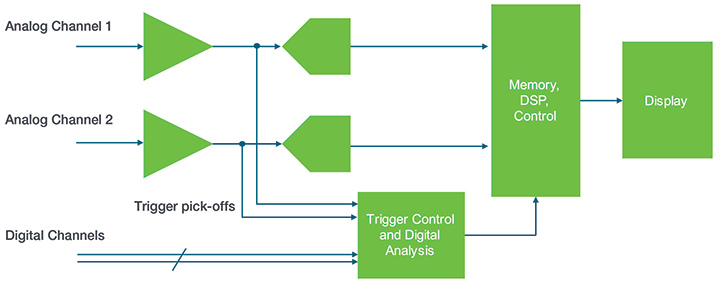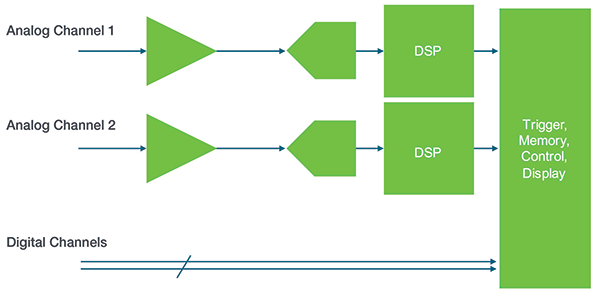
質問:
What are some of the advantages of the 5 and 6 Series MSO digital trigger?
回答:
Since its invention by Tektronix in the 1940s, the oscilloscope’s trigger system has been a key component of the products, providing a stable display of repetitive signals and the capture of specific events in a signal. At the circuit level, the trigger system recognizes the specified event, stops the acquisition of the input signals in the circular-buffer memory, and controls the horizontal position of the acquired signal on the display.
Traditionally, the trigger circuit was based on analog or mixed-signal processing of analog input signals. Though these trigger input signals were similar to the signals digitized by the ADCs, they traveled through the instrument by separate paths, possibly encountering different gains, offsets, coupling, bandwidths, distortions, and noise levels. Taken to an extreme, these path differences can cause the trigger to position the signal incorrectly, capture the wrong event, or fail to capture the right event.

Traditional oscilloscope trigger system with separate analog signal input paths
In the early 2000s, Tektronix introduced digital triggering with the MSO/DPO2000 Series. These oscilloscopes used the same digitized signal to drive the trigger ASIC and the rest of the acquisition system, assuring high performance at low cost.
The 5 and 6 Series MSO hardware provides the next-generation digital trigger, with even higher, real-time performance. Because the trigger system uses the same signal path as the acquisition system, any signal conditioning in the acquisition path (coupling, bandwidth limiting, deskew, and High Res acquisition processing) also affects the trigger signal, giving the user new levels of adjustment and confidence.

Digital oscilloscope trigger system using acquired digitized input signals
The 5 and 6 Series MSO’s digital trigger provides another significant measurement capability – the 8-digit trigger frequency counter. (It is available for free, along with the optional digital voltmeter. just for registering the oscilloscope on tek.com.) This frequency counter provides a readout of the trigger event frequency (e.g. edge, pulse width, runt, or serial or parallel bus pattern) up to about a 150 MHz rate with 1 Hz resolution.
FAQ ID 467411
すべてのFAQを表示 »
